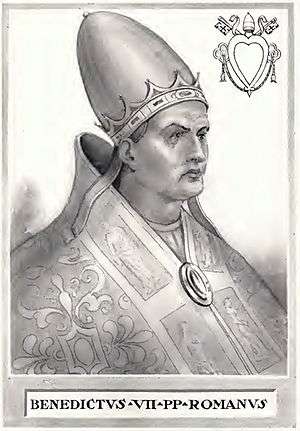974
Year 974 (CMLXXIV) was a common year starting on Thursday (link will display the full calendar) of the Julian calendar.
| Millennium: | 1st millennium |
|---|---|
| Centuries: | |
| Decades: | |
| Years: |
|
| 974 by topic |
|---|
| Leaders |
| Categories |
|
| Gregorian calendar | 974 CMLXXIV |
| Ab urbe condita | 1727 |
| Armenian calendar | 423 ԹՎ ՆԻԳ |
| Assyrian calendar | 5724 |
| Balinese saka calendar | 895–896 |
| Bengali calendar | 381 |
| Berber calendar | 1924 |
| Buddhist calendar | 1518 |
| Burmese calendar | 336 |
| Byzantine calendar | 6482–6483 |
| Chinese calendar | 癸酉年 (Water Rooster) 3670 or 3610 — to — 甲戌年 (Wood Dog) 3671 or 3611 |
| Coptic calendar | 690–691 |
| Discordian calendar | 2140 |
| Ethiopian calendar | 966–967 |
| Hebrew calendar | 4734–4735 |
| Hindu calendars | |
| - Vikram Samvat | 1030–1031 |
| - Shaka Samvat | 895–896 |
| - Kali Yuga | 4074–4075 |
| Holocene calendar | 10974 |
| Iranian calendar | 352–353 |
| Islamic calendar | 363–364 |
| Japanese calendar | Ten'en 2 (天延2年) |
| Javanese calendar | 875–876 |
| Julian calendar | 974 CMLXXIV |
| Korean calendar | 3307 |
| Minguo calendar | 938 before ROC 民前938年 |
| Nanakshahi calendar | −494 |
| Seleucid era | 1285/1286 AG |
| Thai solar calendar | 1516–1517 |
| Tibetan calendar | 阴水鸡年 (female Water-Rooster) 1100 or 719 or −53 — to — 阳木狗年 (male Wood-Dog) 1101 or 720 or −52 |

Pope Benedict VII (r. 974–983)
Events
By place
Europe
- Battle of Danevirke: Emperor Otto II (the Red) defeats the rebel forces of King Harald I (Bluetooth), who has invaded Nordalbingia (modern-day Holstein), to shake off imperial overlordship. Otto's armies swiftly subdue the Danes, consolidating the frontier between Scandinavia and Northern Germany. Meanwhile, Henry II (the Wrangler) begins an rebellion against his cousin Otto. He forges alliances with Bavarian and Saxon nobles.
England
- King Edgar I (the Peaceful) gives English help to Prince Hywel in ousting his uncle, King Iago of Gwynedd from his kingdom.
- A great earthquake occurs in England.[1]
Arabian Empire
- Fall – Caliph Al-Muti dies after a 28-year reign. He is succeeded by his son At-Ta'i as the new ruler of the Abbasid Caliphate. At-Ta'i has no hold on power and becomes a prisoner in the hands of the Buyid Dynasty.
Africa
- The Qarmatians are defeated north of Cairo by Fatimid forces under General Jawhar al-Siqilli (the Sicilian). He consolidates Fatimid rule and sends a legation to the Christian land of Nubia to secure the southern border of Egypt. Arab traders introduce Islam to the population, which gradually supplants Christianity.
- An offensive, by the Spain-based Caliphate of Córdoba brings the Maghrebi Idrisid Dynasty to an end. Caliph Al-Hakam II maintains the supremacy of the caliphate over the kingdoms of Navarra, Castile and León.[2]
China
- The Liao Dynasty exchanges ambassadors with the Song Dynasty on New Years Day (Spring Festival).
- The city of Fuzhou, located in Fujian province, builds new city walls.
By topic
Religion
- Summer – Pope Benedict VI is imprisoned in the Castel Sant'Angelo at Rome, where he is strangled to death through the influence of the powerful Crescentii family. Crescentius I (the Elder), Italian politician and aristocrat, engineers an election and replaces Benedict with his own candidate Franco, who ascends under the title anti-Pope Boniface VII.[3]
- Fall – Boniface VII is expelled by order of Otto II and flees to Constantinople, taking the Church treasury of the Vatican Basilica along with him.[4] He is succeeded by Benedict VII as the 135th pope of the Catholic Church.
- An abbey is founded at the site of Mönchengladbach (Germany).
Births
- Bruno of Querfurt, German missionary bishop (d. 1009)
- Ermengol I, count of Urgell (d. 1010)
- Frederick, count of Walbeck (d. 1018)
- Fujiwara no Korechika, Japanese nobleman (d. 1010)
Deaths
- March 7 – John of Gorze, Frankish abbot and diplomat
- Al-Muti, caliph of the Abbasid Caliphate (b. 914)
- Al-Qadi al-Nu'man, Fatimid jurist and historian
- Benedict VI, pope of the Catholic Church
- Fujiwara no Yoshitaka, Japanese waka poet (b. 954)
- Muhammad Bal'ami, Persian historian and vizier
- Ratherius (or Rathier), bishop of Verona
- Shi Chonggui, emperor of Later Jin (b. 914)
gollark: There's a better one with a conservative/progressive axis too, but I don't have the link.
gollark: The popular political compass is just politicalcompass.org.
gollark: You can still read archived copies, at least, but it means no new content unless this is resolved somehow.
gollark: Summarizing things is hard so I might as well point you to this reddit thread: https://www.reddit.com/r/slatestarcodex/comments/hef5es/hi_what_was_slate_star_codex/
gollark: ... was.
References
- Stratton, J.M. (1969). Agricultural Records. John Baker. ISBN 0-212-97022-4.
- Gilbert Meynier (2010). L'Algérie cœr du Maghreb classique. De l ouverture islamo-arabe au repli (658-1518. Paris: La Découverte; p. 42.
- Richard P. McBrien (2000). Lives of the Popes: The Pontiffs from St. Peter to Benedict XVI, p. 186 (Harper Collins).
- Collins, Roger (2009). Keepers of the Keys of Heaven: A History of the Papacy, Basic Books.
This article is issued from Wikipedia. The text is licensed under Creative Commons - Attribution - Sharealike. Additional terms may apply for the media files.